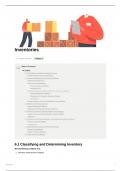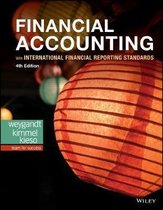Summary
Summary Ch 6 Inventories - Financial Accounting with International Financial Reporting Standards - FAC2
- Course
- Institution
- Book
Provides in-depth summary of chapter 6. topics include Inventory Methods and Financial Effects ( First-In, First-Out (FIFO), Average-Cost, Lower-of-Cost-or-Net Realizable Value (LCNRV), LIFO Inventory Method
[Show more]




